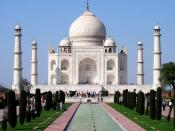Throughout time there have been countries that have refused to allow change. Traditional China, India, and the Arab states are less likely to change. In each country, religion, government, and the status of women are some of the factors that impede change in these countries.
One of the factors that hindered change was religion. According to the Webster dictionary, religion is "a personal set or institutionalized system of religious beliefs, attitudes, and practices" India, China and the Arab states are all affected by the factor of their religion. India is less likely to change because of religion. India's religion is Hinduism. They believe in many Gods and believe in reincarnation. In India there is a something called Dharma (meaning duty) and karma (meaning fate), people believe that if you don't do your dharma well then it will affect your karma in your after life. With this being apart of the Indian religion, the people in India's caste system tend not to want to change because it will affect their karma.
That's just one of the reasons why religion is a factor in the impediment of progress in India.
In traditional China religion plays a big role in continuity because China has Taoism as their religion. Taoism means the belief that everything in this world has a spirit within. Also, there is a man named Confucius an ethical philosopher who came up with the five relationships in society. One of them is filial piety meaning parents teach children, the children listen and respect the parents. The children after there parents die have to respect their parents and their ancestors. This means that religion for the people of China would continue, for their ancestors are important to them and they wouldn't want to change it. It would go against their ethics and...


